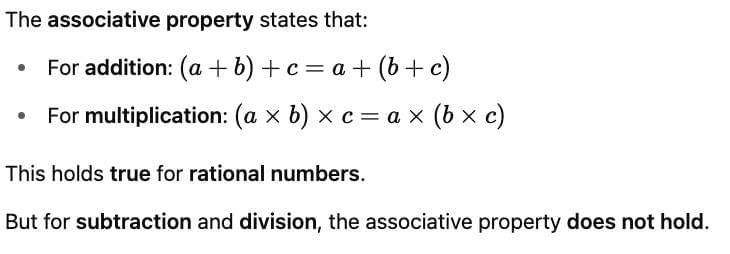Class 8 Exam > Class 8 Tests > Test: Rational Numbers- 2 - Class 8 MCQ
Test: Rational Numbers- 2 - Class 8 MCQ
Test Description
15 Questions MCQ Test - Test: Rational Numbers- 2
Test: Rational Numbers- 2 for Class 8 2025 is part of Class 8 preparation. The Test: Rational Numbers- 2 questions and answers have been prepared
according to the Class 8 exam syllabus.The Test: Rational Numbers- 2 MCQs are made for Class 8 2025 Exam.
Find important definitions, questions, notes, meanings, examples, exercises, MCQs and online tests for Test: Rational Numbers- 2 below.
Solutions of Test: Rational Numbers- 2 questions in English are available as part of our course for Class 8 & Test: Rational Numbers- 2 solutions in
Hindi for Class 8 course.
Download more important topics, notes, lectures and mock test series for Class 8 Exam by signing up for free. Attempt Test: Rational Numbers- 2 | 15 questions in 20 minutes | Mock test for Class 8 preparation | Free important questions MCQ to study for Class 8 Exam | Download free PDF with solutions
Detailed Solution for Test: Rational Numbers- 2 - Question 1
Detailed Solution for Test: Rational Numbers- 2 - Question 2
Test: Rational Numbers- 2 - Question 3
Which of the following is the Multiplicative identity for rational numbers?
Detailed Solution for Test: Rational Numbers- 2 - Question 3
Detailed Solution for Test: Rational Numbers- 2 - Question 4
Detailed Solution for Test: Rational Numbers- 2 - Question 5
Test: Rational Numbers- 2 - Question 6
_____ is the only rational number that is equal to its reciprocal.
Detailed Solution for Test: Rational Numbers- 2 - Question 6
Detailed Solution for Test: Rational Numbers- 2 - Question 7
Detailed Solution for Test: Rational Numbers- 2 - Question 8
Test: Rational Numbers- 2 - Question 9
The product of two rational numbers is always a _______.
Detailed Solution for Test: Rational Numbers- 2 - Question 9
Test: Rational Numbers- 2 - Question 10
A number which can be written in the form, p/q where p and q are integers and _____ is called a rational number.
Detailed Solution for Test: Rational Numbers- 2 - Question 10
Detailed Solution for Test: Rational Numbers- 2 - Question 11
Detailed Solution for Test: Rational Numbers- 2 - Question 12
Detailed Solution for Test: Rational Numbers- 2 - Question 13
Detailed Solution for Test: Rational Numbers- 2 - Question 14
Detailed Solution for Test: Rational Numbers- 2 - Question 15
Information about Test: Rational Numbers- 2 Page
In this test you can find the Exam questions for Test: Rational Numbers- 2 solved & explained in the simplest way possible.
Besides giving Questions and answers for Test: Rational Numbers- 2, EduRev gives you an ample number of Online tests for practice
Download as PDF





















